

Meat & Cancer. Colorectal Cancer February 2021. Role of Diet in Colorectal Cancer Incidence: Umbrella Review of Meta-analyses of Prospective Observational Studies. Key Points Question How credible is the evidence behind the association of dietary factors with colorectal cancer (CRC) risk in published meta-analyses of prospective observational studies?
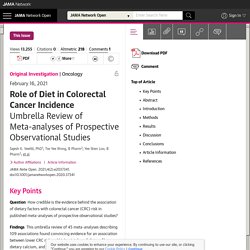
Findings This umbrella review of 45 meta-analyses describing 109 associations found convincing evidence for an association between lower CRC risk and higher intakes of dietary fiber, dietary calcium, and yogurt and lower intakes of alcohol and red meat. Meaning This study suggests that dietary factors may have a role in the development and prevention of CRC, but more research is needed on specific foods for which the evidence remains suggestive.
Importance Several meta-analyses have summarized evidence for the association between dietary factors and the incidence of colorectal cancer (CRC). The Role of Diet in Cancer Prevention and Chemotherapy Efficacy. American Cancer Society Guideline for Diet and Physical Activity for cancer prevention - Rock - - CA: A Cancer Journal for Clinicians - Wiley Online Library. Overweight, Obesity, and Excess Body Fat Recommendation: Achieve and maintain a healthy body weight throughout life Keep body weight within the healthy range, and avoid weight gain in adult life.
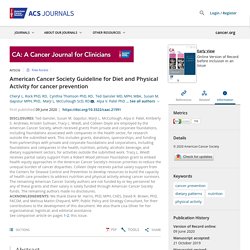
Excess body fat (overweight and obesity) occurs from energy imbalance as a result of excess energy intake (from both food and beverages) and low energy expenditure, although inherited genetic factors and changes in metabolism with aging also contribute to body fatness. The dietary factors most consistently associated with excess body fat include sugar‐sweetened beverages, “fast‐foods,” and a “Western”‐type diet (ie, high in added sugars, meat, fat), whereas foods containing dietary fiber and a “Mediterranean” dietary pattern may reduce risk.4 In addition, aerobic physical activity, including walking, is associated with a lower risk of excess body fatness, whereas sedentary behaviors and greater screen time are associated with higher risk.4 Physical Activity Recommendation: Be physically active.
Diet, nutrition, and cancer risk: what do we know and what is the way forward? Timothy J Key, deputy director1, Kathryn E Bradbury, senior research fellow2, Aurora Perez-Cornago, senior nutritional epidemiologist1, Rashmi Sinha, senior investigator3, Konstantinos K Tsilidis, assistant professor of epidemiology45, Shoichiro Tsugane, director6Author affiliationsCorrespondence to: TJ Key tim.key@ndph.ox.ac.uk Timothy J Key and colleagues describe the evidence linking diet and nutrition to cancer risk, concluding that obesity and alcohol are the most important factors Scientists have suspected for decades that nutrition has an important influence on the risk of developing cancer.
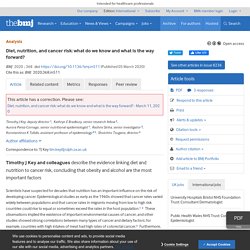
Cancer is predicted to be the leading cause of death in every country of the world by the end of this century.6 Although dietary factors are thought to be important in determining the risk of developing cancer, establishing the exact effects of diet on cancer risk has proved challenging. Cancers of the oral cavity and pharynx Box 1 Box 2. Epigenetic Gene Regulation by Dietary Compounds in Cancer Prevention.
We use cookies to enhance your experience on our website.By continuing to use our website, you are agreeing to our use of cookies.
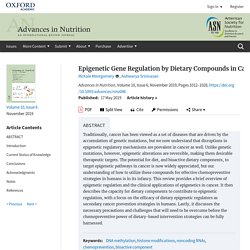
You can change your cookie settings at any time. <a href=" Find out more</a> Skip to Main Content Sign In Register Close Advanced Search Article Navigation Volume 10 Issue 6 November 2019 Article Contents. Nutrigenomics: Epigenetics and cancer prevention: A comprehensive review: Critical Reviews in Food Science and Nutrition: Vol 0, No 0. Due to change in lifestyle and food habits, people are more at risk of diet-related diseases and cancers.
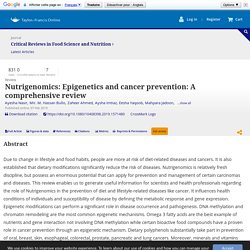
It is also established that dietary modifications significantly reduce the risk of diseases. American College of Sports Medicine Roundtable Report on Phy... : Medicine & Science in Sports & Exercise. It was estimated that 18.1 million individuals were diagnosed with cancer in 2018 and 9.6 million individuals died from the disease—making cancer the second leading cause of mortality worldwide (1).
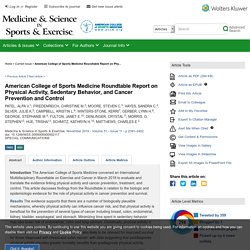
In the United States (US) alone, the lifetime risk of developing cancer is 40% in men and 38% in women (2), and 1.74 million individuals were diagnosed with cancer in 2018 (3). There are also high direct and indirect costs related to the cancer burden; for example, in the US alone, the annual cost of cancer care is US $158 billion (4), with billions of additional dollars lost to disability, lost work, and lost household productivity (5). Thus, the burden of cancer remains a significant public health issue worldwide, and there is an increasing need to understand how modifiable health behaviors like physical activity may help prevent and control cancer in the population.
Cancer and Mediterranean Diet: A Review. Nutritional Metabolomics in Cancer Epidemiology: Current Trends, Challenges, and Future Directions. Preventable Cancer Burden Associated with Poor Diet in the United States. New Report Highlights Obesity-Cancer Crisis – AICR Blog. By Author Nigel BrocktonPosted on November 6, 2018November 8, 2018.
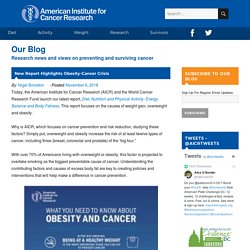
SEOM clinical guidelines to primary prevention of cancer (2018) It is estimated that 30–35% of all malignant tumors are diet related and there are enough scientific data to endorse dietary recommendations in cancer prevention [5].
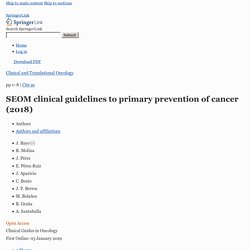
The relationship between diet and cancer is common knowledge, albeit with a significant influence of biased data and commercial interests. Table 1 displays dietary recommendations for the prevention of cancer put forth by three European and North American organizations; they are based on robust evidence and are mutually consistent. Table 1 Dietary recommendations adapted from the World Cancer Research Fund (WCRF), the American Cancer Society (ACS), and the European Code Against Cancer Most of the data regarding nutrition come from retrospective meta-analyses of case-control studies and prospective cohort studies.
Another systematic revision and meta-analysis (PRISMA) [8] evaluated the association between adherence to established dietary and physical activity guidelines and the general incidence and mortality due to cancer. eNews: Coffee and Your Cancer Risk. This article appears in the May 3, 2018 issue of AICR's eNews.

Recent headlines have brought coffee back into the health spotlight. So, what are the real health benefits and risks of this delicious beverage? We break down the latest research on coffee and cancer and why it’s making news again. The Research. Diet, Nutrition, Physical Activity and Cancer: a Global Perspective. Translating Mechanism-Based Strategies to Break the Obesity−Cancer Link: A Narrative Review.
Alcohol and Cancer: A Statement of the American Society of Clinical Oncology: Journal of Clinical Oncology: Vol 0, No 0. The importance of alcohol drinking as a contributing factor to the overall cancer burden is often underappreciated.
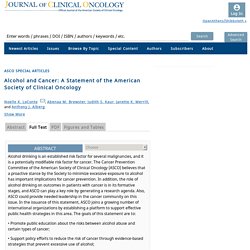
In fact, alcohol drinking is an established risk factor for several malignancies. Interventions to reduce the risk of ovarian and fallopian tube cancer: A European Menopause and Andropause Society Postition Statement. American Institute for Cancer Research (AICR) IARC Monographs Volume 116: Evaluation of drinking coffee, maté, and very hot beverages. The International Agency for Research on Cancer (IARC), the cancer agency of the World Health Organization, has evaluated the carcinogenicity of drinking coffee, maté and very hot beverages. The detailed assessments will be published as Volume 116 of the IARC Monographs. A summary of the evaluations has now been published in The Lancet Oncology. Also available are a Q&A on the Volume 116 evaluations, a Fact sheet and Debunking the myths. Aspirin Use for the Primary Prevention of CVD and CRC.
European Code Against Cancer - International Agency for Research on Cancer (IARC). European Commission: 12 ways to reduce your cancer risk. Vitamin, Mineral, and Multivitamin Supplements for the Primary Prevention of Cardiovascular Disease and Cancer: U.S. Preventive Services Task Force Recommendation StatementMultivitamin Supplements for Cardiovascular Disease and Cancer. Nutritional factors and cancer risk- A review of the evidence: Alcoholic beverages, obesity, physical activity and others. Alcoholic beverages include wines, beers, spirits, ciders and various other alcoholic drinks that may be locally important.
They contain ethanol which results from the process of fermentation. In epidemiological studies, the exposure to alcoholic beverages is examined by different measures: drinking or not, number of drinks/glasses or units of 10 g alcohol per day or per week.